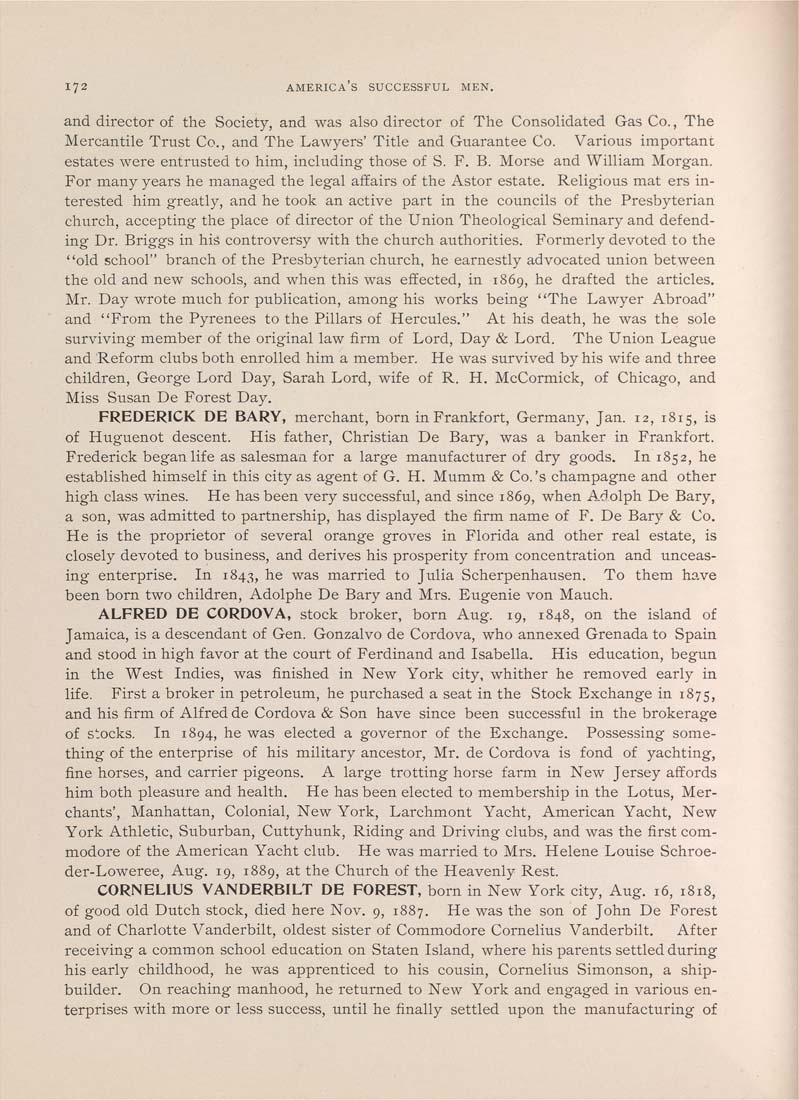172 America's successful men.
and director of the Society, and was also director of The Consolidated Gas Co., The
Mercantile Trust Co., and The Lawyers' Title and Guarantee Co. Various important
estates were entrusted to him, including those of S. F. B. Morse and William Morgan.
For many years he managed the legal affairs of the Astor estate. Religious mat ers in¬
terested him greatly, and he took an active part in the councils of the Presbyterian
church, accepting the place of director of the Union Theological Seminary and defend¬
ing Dr. Briggs in hiS controversy with the church authorities. Formerly devoted to the
"old school" branch of the Presbyterian church, he earnestly advocated union between
the old and new schools, and when this was effected, in 1869, he drafted the articles.
Mr. Day wrote much for publication, among his works being ' 'The Lawyer Abroad"
and "From the Pyrenees to the Pillars of Hercules." At his death, he was the sole
surviving member of the original law firm of Lord, Day & Lord. The Union League
and Reform clubs both enrolled him a member. He was survived by his wife and three
children, George Lord Day, Sarah Lord, wife of R. H. McCormick, of Chicago, and
Miss Susan De Forest Day.
FREDERICK DE BARY, merchant, born in Frankfort, Germany, Jan. 12, 1815, is
of Huguenot descent. His father. Christian De Bary, was a banker in Frankfort.
Frederick began life as salesman for a large manufacturer of dry goods. In 1852, he
established himself in this city as agent of G. H. Mumm & Co.'s champagne and other
high class wines. He has been very successful, and since 1869, when Adolph De Bary,
a son, was admitted to partnership, has displayed the firm name of F. De Bary & Co.
He is the proprietor of several orange groves in Florida and other real estate, is
closely devoted to business, and derives his prosperity from concentration and unceas¬
ing enterprise. In 1843, he was married to Julia Scherpenhausen. To them have
been born two children, Adolphe De Bary and Mrs. Eugenie von Mauch.
ALFRED DE CORDOVA, stock broker, born Aug. 19, 1848, on the island of
Jamaica, is a descendant of Gen. Gonzalvo de Cordova, who annexed Grenada to Spain
and stood in high favor at the court of Ferdinand and Isabella. His education, begun
in the West Indies, was finished in New York city, whither he removed early in
life. First a broker in petroleum, he purchased a seat in the Stock Exchange in 1875,
and his firm of Alfred de Cordova & Son have since been successful in the brokerage
of stocks. In 1894, he was elected a governor of the Exchange. Possessing some¬
thing of the enterprise of his military ancestor, Mr. de Cordova is fond of yachting,
fine horses, and carrier pigeons. A large trotting horse farm in New Jersey affords
him both pleasure and health. He has been elected to membership in the Lotus, Mer¬
chants', Manhattan, Colonial, New York, Larchmont Yacht, American Yacht, New
York Athletic, Suburban, Cuttyhunk, Riding and Driving clubs, and was the first com¬
modore of the American Yacht club. He was married to Mrs. Helene Louise Schroe-
der-Loweree, Aug. 19, 1889, at the Church of the Heavenly Rest.
CORNELIUS VANDERBILT DE FOREST, born in New York city, Aug. 16, 1818,
of good old Dutch stock, died here Nov. 9, 1887. He was the son of John De Forest
and of Charlotte Vanderbilt, oldest sister of Commodore Cornelius Vanderbilt. After
receiving a common school education on Staten Island, where his parents settled during
his early childhood, he was apprenticed to his cousin, Cornelius Simonson, a ship¬
builder. On reaching manhood, he returned to New York and engaged in various en¬
terprises with more or less success, until he finally settled upon the manufacturing of
|








